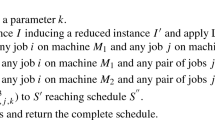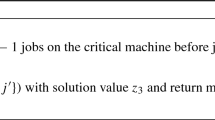Abstract
Q||C max denotes the problem of scheduling n jobs on m machines of different speeds such that the makespan is minimized. In the paper two special cases of Q||C max are considered: Case I, when m–1 machine speeds are equal, and there is only one faster machine; and Case II, when machine speeds are all powers of 2. Case I has been widely studied in the literature, while Case II is significant in an approach to design so called monotone algorithms for the scheduling problem.
We deal with the worst case approximation ratio of the classic list scheduling algorithm ’Longest Processing Time (LPT)’. We provide an analysis of this ratio Lpt/Opt for both special cases: For one fast machine, a tight bound of \((\sqrt{3}+1)/2\approx 1.366\) is given. When machine speeds are powers of 2 (2-divisible machines), we show that in the worst case 41/30 <Lpt/Opt<42/30=1.4.
To our knowledge, the best previous lower bound for both problems was 4/3–ε, whereas the best known upper bounds were 3/2–1/2m for Case I [6] resp. 3/2 for Case II [10]. For both the lower and the upper bound, the analysis of Case II is a refined version of that of Case I.
Access this chapter
Tax calculation will be finalised at checkout
Purchases are for personal use only
Preview
Unable to display preview. Download preview PDF.
Similar content being viewed by others
References
Archer, A., Tardos, É.: Truthful mechanisms for one-parameter agents. In: Proc. 42nd IEEE Symp. on Found. of Comp. Sci (FOCS), pp. 482–491 (2001)
Cho, Y., Sahni, S.: Bounds for list schedules on uniform processors. SIAM Journal on Computing 9(1), 91–103 (1980)
Coffman, E.G., Garey, M.R., Johnson, D.S.: An application of bin-packing to multiprocessor scheduling. SIAM Journal on Computing 7(1), 1–17 (1978)
Dobson, G.: Scheduling independent tasks on uniform processors. SIAM Journal on Computing 13(4), 705–716 (1984)
Friesen, D.K.: Tighter bounds for LPT scheduling on uniform processors. SIAM Journal on Computing 16(3), 554–560 (1987)
Gonzalez, T., Ibarra, O.H., Sahni, S.: Bounds for LPT schedules on uniform processors. SIAM Journal on Computing 6(1), 155–166 (1977)
Hochbaum, D.S., Shmoys, D.B.: A polynomial approximation scheme for scheduling on uniform processors: Using the dual approximation approach. SIAM J. Comp. 17(3), 539–551 (1988)
Horowitz, E., Sahni, S.: Exact and approximate algorithms for scheduling nonidentical processors. Journal of the ACM 23, 317–327 (1976)
Kovács, A.: Tighter approximation bounds for LPT scheduling in two special cases, Extended version: http://www.mpi-inf.mpg.de/~panni/approx.ps
Kovács, A.: Fast monotone 3-approximation algorithm for scheduling related machines. In: Brodal, G.S., Leonardi, S. (eds.) ESA 2005. LNCS, vol. 3669, pp. 616–627. Springer, Heidelberg (2005)
Li, R., Shi, L.: An on-line algorithm for some uniform processor scheduling. SIAM Journal on Computing 27(2), 414–422 (1998)
Liu, J.W.S., Liu, C.L.: Bounds on scheduling algorithms for heterogeneous computing systems. In: Proc. Intern. Feder. of Inf. Proc. Soc, pp. 349–353 (1974)
Mireault, P., Orlin, J.B., Vohra, R.V.: A parametric worst case analysis of the LPT heuristic for two uniform machines. Oper. Res. 45(1), 116–125 (1997)
Johnson, D.S., Garey, M.R.: Computers and Intractability; A Guide to the Theory of NP-completeness. Freeman, San Francisco (1979)
Auletta, V., De Prisco, R., Penna, P., Persiano, G.: Deterministic truthful approximation mechanisms for scheduling related machines. In: Diekert, V., Habib, M. (eds.) STACS 2004. LNCS, vol. 2996, pp. 608–619. Springer, Heidelberg (2004)
Author information
Authors and Affiliations
Editor information
Editors and Affiliations
Rights and permissions
Copyright information
© 2006 Springer-Verlag Berlin Heidelberg
About this paper
Cite this paper
Kovács, A. (2006). Tighter Approximation Bounds for LPT Scheduling in Two Special Cases. In: Calamoneri, T., Finocchi, I., Italiano, G.F. (eds) Algorithms and Complexity. CIAC 2006. Lecture Notes in Computer Science, vol 3998. Springer, Berlin, Heidelberg. https://doi.org/10.1007/11758471_20
Download citation
DOI: https://doi.org/10.1007/11758471_20
Publisher Name: Springer, Berlin, Heidelberg
Print ISBN: 978-3-540-34375-2
Online ISBN: 978-3-540-34378-3
eBook Packages: Computer ScienceComputer Science (R0)





